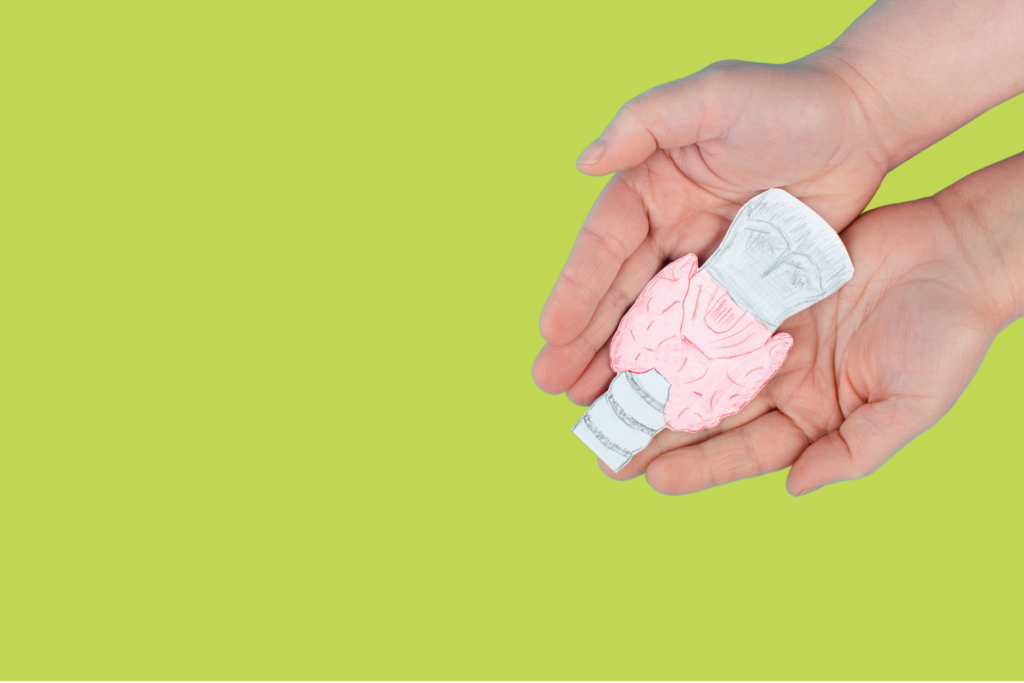Proper functioning of thyroid and endocrine system ensures efficient operation of the entire body. Hypothyroidism is the most common endocrine disorder and occurs more frequently in women. It is a chronic condition and the risk increases with age. Regular check-ups are extremely important, as endocrine disorders typically develop slowly, with gradually intensifying symptoms, making early detection difficult.
Functions of hormones produced by thyroid
Thyroid is an endocrine gland located in anteroinferior part of neck, composed of two lobes. Its primary function is production of hormones – triiodothyronine (T3) and thyroxine (T4). Thyroid hormones are chiefly responsible for proper functioning of the brain and nervous system, course of pregnancy, body growth, immunity, kidney function, skeletal development, heat production, metabolism, as well as reproductive function and libido.
Symptoms of thyroid dysfunction
Characteristic symptoms of hypothyroidism can manifest through range of signs, including:
- dry and pale skin
- hair loss
- brittle nails
- sensitivity to cold
- tendency to edema
- drowsiness
- concentration problems
- chronić fatigue
- constipation
Symptoms of Hashimoto’s disease are similar to those of hypothyroidism and include, among others: low mood, weakness, fatigue, dry skin, hair loss, and concentration problems.
Hypothyroidism and Hashimoto’s disease
Hypothyroidism
In hypothyroidism, body suffers from deficiency of thyroid hormones in blood. There are many possible causes of hypothyroidism, including radioactive iodine therapy, surgical procedures involving thyroid removal or childbirth (postpartum thyroiditis).
Hypothyroidism can also develop as a result of Hashimoto’s disease, which often leads to permanent damage to the thyroid gland and, consequently, to its underactivity.
If left untreated, hypothyroidism can result in weight gain, lipid metabolism disorders, increased risk of cardiovascular diseases, depressive disorders and concentration and memory problems.
Hashimoto’s disease
Hashimoto’s disease is an autoimmune disorder, also known as chronic lymphocytic thyroiditis, in which body produces antibodies against thyroid peroxidase (anti-TPO) and thyroglobulin (anti-TG), leading to hypothyroidism.
Hashimoto’s disease develops when immune system attacks thyroid gland, causing its atrophy due to excessive activity of lymphocytes. Development of Hashimoto’s is often linked primarily to environmental, dietary and genetic factors, as well as presence of other autoimmune diseases.
Chronic autoimmune thyroiditis is frequently associated with type 1 diabetes, celiac disease, rheumatoid arthritis, systemic lupus erythematosus and other autoimmune conditions.
Environmental factors contributing to development of Hashimoto’s include viral and bacterial infections, stress, overtraining, smoking, external radiation and treatment with radioactive iodine.
In case of Hashimoto’s disease, dietary factors may include an excess of iodine in diet and deficiencies in certain vitamins and minerals, such as selenium.
Diagnosis
To diagnose thyroid dysfunction, laboratory tests are performed – primarily measuring level of TSH, as well as free thyroid hormones fT3 and fT4.
It is also worth testing for thyroid antibodies, such as anti-TPO and anti-TG, which help detect autoimmune diseases and inflammation. Reference ranges are broad, so it’s important to adjust them according to your age.
Ultrasound of thyroid is also performed to rule out nodules or goiter.
Nutrition in hypothyroidism and Hashimoto’s disease
Role of nutrition
The most important element of treatment is pharmacotherapy, but proper nutrition can help slow the progression of disorders resulting from impaired thyroid function, improve patient’s well-being, increase effectiveness of medication and minimize inflammation in body caused by Hashimoto’s disease.
Caloric intake
Considering that people with hypothyroidism often struggle with excess weight, it is important to ensure an appropriate calorie intake, tailored individually to factors such as age, gender, physical activity and current body weight.
Anti-inflammatory diet
Anti-inflammatory diet is particularly beneficial in cases of Hashimoto’s thyroiditis, where body is affected by chronic inflammatory state. Anti-inflammatory foods are mainly minimally processed products – fruits and vegetables, whole grains, fish, plant-based oils, seeds, nuts and fermented foods. Some spices, such as turmeric, cinnamon, dried oregano and basil, curry powder and ginger, also have strong anti-inflammatory properties. At the same time, it’s important to limit pro-inflammatory foods – highly processed items rich in trans fats, sugar, polycyclic aromatic hydrocarbons (e.g. grilled or heavily fried foods) and refined wheat products (e.g. white bread).
Adequate protein intake
Protein intake is especially important in thyroid disorders, as protein is involved in production of thyroid hormones and helps boost metabolism. Good sources include lean meats, fish, and legumes. Protein also increases satiety, which can help maintain regular meal intervals.
Healthy fats
Attention should be paid to both the quantity and quality of fats consumed. Low-fat diets may impair immune system function and reduce absorption of fat-soluble vitamins. It’s important to include unsaturated fats in diet, especially omega-3 fatty acids, which support conversion of T4 to T3 in liver and have anti-inflammatory properties. Valuable fat sources include fatty sea fish, nuts, seeds and plant oils – particularly olive oil and flaxseed oil.
Importance of glycemic index and glycemic load
Due to the frequent occurrence of carbohydrate metabolism disorders in people with hypothyroidism, it is recommended to base diet on foods with low glycemic index (GI) and glycemic load (GL), which do not cause sharp increase in blood glucose levels. It is also important to include whole grains, fruits and vegetables in diet to increase fiber intake, which helps with common issues such as constipation. Additionally, fiber helps regulate satiety and positively affects cholesterol levels, which can also be problematic in individuals with hypothyroidism.
Vitamins and micronutrients
Iodine
Iodine is essential for proper thyroid function. Deficiency in this micronutrient results in decreased levels of T3 and T4 and increased level of TSH, disrupting hormone production.
Both deficiency and excess of iodine can be harmful – excessive intake may impair hormone synthesis and intensify inflammatory response in Hashimoto’s disease.
Main dietary sources include iodized table salt, fish, seafood and seaweed.
Selenium
Deficiency in selenium can reduce production of T3. Selenium also has antioxidant properties that protect thyroid from oxidative stress. Its proper function requires adequate iodine intake, as the two elements interact with one another.
To ensure sufficient selenium intake, include brazil nuts, salmon, tuna, beef, turkey and eggs in your diet. Selenium supplements should not be taken without first checking your levels and consulting doctor.
Zinc
Zinc is also essential, as it plays role in proper functioning of the immune system. Excellent sources of zinc include liver, pumpkin seeds, white beans and buckwheat groats.
Vitamin D
Maintaining optimal levels of vitamin D is also crucial, especially in autoimmune-related hypothyroidism. There is often a correlation between low vitamin D levels and Hashimoto’s disease. Studies have also shown that the lower vitamin D level, the higher TSH concentration.
Only about 20% of body’s vitamin D needs can be met through diet, so during months of October to March, when sun exposure is limited in Poland, vitamin D supplementation should be considered.
Preventive doses recommended during this period range between 2000–4000 IU/day for adults.
Iron
Iron deficiency is common in individuals with hypothyroidism. Contributing factors include heavy menstrual bleeding, coexisting autoimmune anemia or decreased stomach acid production. It’s important to monitor iron levels and ensure adequate dietary intake.
Iron can be supplied through:
- Animal sources (heme iron, highly bioavailable): organ meats, red meat, poultry, fish and seafood
- Plant sources (non-heme iron, less bioavailable): legumes, grains, egg yolks and certain vegetables (parsley, broccoli, beets), as well as dried fruits (apricots, plums, raisins)
Do thyroid disorders require elimination of certain food groups?
There are many myths surrounding diet for hypothyroidism and Hashimoto’s disease, particularly regarding elimination of gluten, dairy or soy. Too many unnecessary dietary restrictions can actually increase the risk of nutrient deficiencies.
Gluten
Consumption of gluten is often controversial. It turns out that celiac disease often coexists with Hashimoto’s disease, but only in cases where it occurs (or non-celiac gluten sensitivity) it is necessary to eliminate gluten from diet.
Dairy
The same applies to dairy. Only in cases of lactose intolerance should lactose-free diet be introduced. Absorption of T4 can indeed be impaired in case of lactose intolerance, but elimination should not occur without its confirmation. Doing so may lead to deficiencies, particularly in calcium and protein.
Soy
Excluding soy products from diet is also not necessary. However, it is important to be aware of presence of isoflavones in soy products, which can hinder thyroid’s ability to utilize iodine. Including soy products several times a week should not negatively affect treatment process. However, it is essential to avoid consuming soy products for breakfast. Protein in soy can interfere with absorption of T4, so it’s important to maintain a gap between consuming soy and taking medication.
Cruciferous vegetables
The same applies to cruciferous vegetables, which are rich in goitrogens, such as cabbage, broccoli, cauliflower, radish and kale. These compounds can affect thyroid hormone synthesis by binding to iodine. Completely eliminating goitrogens from diet is unnecessary, but moderation in their consumption is advised. Additionally, cooking these vegetables reduces their goitrogen content by about 30%, so it is best to consume cruciferous vegetables in this form.
Taking medication
To effectively treat hypothyroidism, it is important to follow the rules for taking medication, as they can influence its absorption.
- First and foremost, medication should be taken in the morning on an empty stomach, at least 30 minutes, and preferably one hour before first meal.
- Only water should be used to take medication. Other liquids such as tea, coffee, juice or milk can reduce absorption of thyroxine from gastrointestinal tract. However, one should be cautious with highly mineralized waters, as the presence of minerals (especially calcium) can interfere with medication’s absorption.
- Meal consumed after taking the medication should not include soy products or foods high in calcium, as they can inhibit absorption of medication.
- Other medications may interact with thyroid medication, especially proton pump inhibitors (PPIs) or supplements containing calcium or iron.
Lifestyle
Sleep
Non-dietary factors that significantly affect well-being of people with hypothyroidism should not be underestimated. Adequate sleep is crucial because thyroid hormones are controlled by circadian rhythm. Peak secretion of TSH and TRH occurs during night. Lack of sleep is associated with nearly two-fold increase in TSH levels at night, suggesting that proper, high-quality sleep can regulate hormone levels. Chronic sleep disturbances and staying up late can reduce hormone production.
Stress
Another essential factor for proper thyroid function is stress management. When exposed to chronic stress, our body produces increased amounts of cortisol, reducing overall performance, causing fatigue and, above all, lowering thyroid function. Prolonged stress disrupts hypothalamic-pituitary-adrenal axis, which also affects thyroid, as its function is regulated by hypothalamus and pituitary gland. Unfortunately, not every stress trigger can be eliminated. Therefore, it is crucial to learn how to manage stress and ensure proper rest.
Summary
For thyroid to function properly, it is important to approach the problem comprehensively. It is worth noting that gradual changes in diet will generally work better for most people than completely changing the existing eating habits. Rather than focusing on eliminating specific food components, it is better to introduce valuable foods into the diet, take care of sleep and recovery and ensure proper medication intake. Small, incremental changes over a longer period of time can have significant impact.
Anti-inflammatory diet for thyroid disorders – mobile app subscription
If you have hypothyroidism or Hashimoto’s disease and want to take better care of your eating habits, try mobile app subscription featuring a sample anti-inflammatory diet. Calculate your caloric needs and get inspired by recipes designed to nourish your body with essential macro- and micronutrients.
Are you looking for personalized support from a dietitian? If you’d like to tailor your diet to your individual needs, capabilities and expectations, book an initial consultation or purchase 3-month nutrition plan package.
Sources:
- Bolanowski M., Niedoczynność tarczycy, „Lekarz POZ”, 2016, nr 3.
- Budlewski T., Franek E., Diagnostyka obrazowa chorób tarczycy, „Choroby serca i naczyń”, 6, 2009, nr 1.
- Garber J. R., Cobin R. H., Gharib H., Pessah-Pollack R., Singer P. A., Woeber K. A., Clinical practice guidelines for hypothyroidism in adults: cosponsored by the American Association of Clinical Endocrinologists and the American Thyroid Association, 2012.
- Inhatowicz P., Ptak E., Masz to we krwi, 2017.
- Liskowska M., Leczenie chorób tarczycy, Łódź, 2018.
- Marszałkowska-Jakubik J., Dieta przeciwzapalna w Hashimoto, „Food expert”, 2021, nr 3.
- Marzena Lamont M., Słoma-Krześlak M., Hashimoto – co wiemy dzisiaj?, „Food expert”, 2021, nr 1.
- Ratajczak A. E., Moszak M., Grzymisławski M., Zalecenia żywieniowe w niedoczynności tarczycy i chorobie Hashimoto, „Pielęgniarstwo i zdrowie publiczne”, 7, 2017, nr 4.
- Sadowska J., Stawska A., Dietoprofilaktyka chorób współtowarzyszących niedoczynności tarczycy w wybranej grupie kobiet, „Bromatologia, Chemia, Toksykologia”, XLVIII, 2015, nr 4.
- Skoczek W., Salamaga Ł., Szymajda W., Zaleski B., Szymczak M., Araszewski M., Brzezińska K., Owecki M., Autoimmunologiczne choroby tarczycy – przegląd literatury, „Postępy biologii komórki”, 47, 2020, nr 2.
- Szwajkosz K., Zwolak A., Dudzińska M., Świrska J., Oszywa-Chabros A., Wawryniuk A., Łuczyk R., Daniluk J., Nadwaga i otyłość a niedoczynność tarczycy, Journal of Education, Health and Sport, 6, 2016, nr 7.
- Wu K., Zhou Y., Ke S., Huang J., Gao X., Li B., Lin X., Liu X., Ma L., Wang L., Wu L., Wu L., Xie Ch., Xu. J., Wang Y., Liu L., Lifestyle is associated with thyroid function in subclinical hyporhyroidism: a cross-sectional study, 2021.
- Zakrzewska E., Zegan M., Michota-Katulska E., Zalecenia dietetyczne w niedoczynności tarczycy przy współwystępowaniu choroby Hashimoto, „Bromatologia, Chemia, Toksykologia”, XLVIII, 2015, nr 2.



